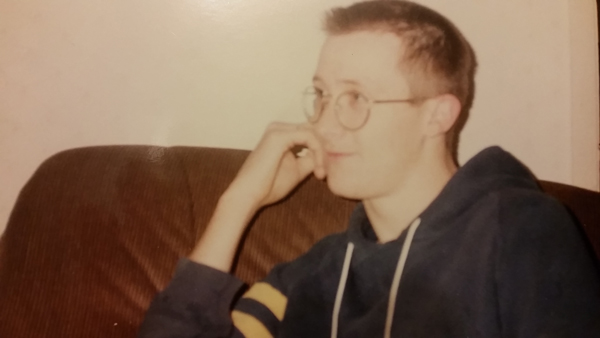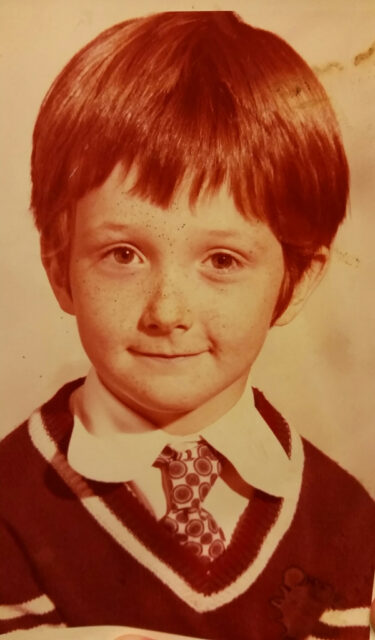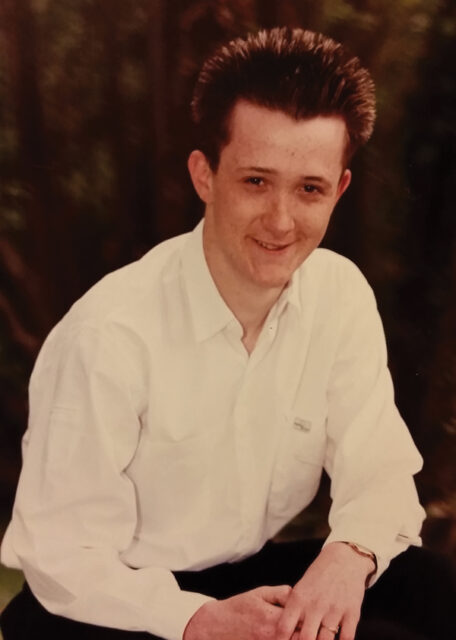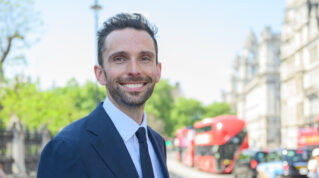Why did Vic Goddard let Channel 4 unleash 60 cameras and 22 microphones into Passmores Academy for seven weeks in 2011? The result, Educating Essex, caused a media storm with the school swamped by a mountain of emails and Goddard attacked by “some of the right-wing press” who said vulnerable children had been put in the spotlight.
Three years later and it’s clear that it’s his desire to be open about what schools do, and what really goes on in them. That’s very much in keeping with his own values. He’s direct, honest and open – happy to be upfront.
He says the series made him “very aware of how secretive schools are, because what we had was lots of feedback from parents”. Most of those emails came from parents of teenagers thanking Passmores; it was the first time they were able to engage with their child about school. They had sat down together and watched the programme.

“They went, ‘Is that really what it’s like?’, and they (the students) went, ‘yes’, and they could have a dialogue. It made me very aware that actually we don’t let people in very often, and we should be open about it.”
He’s been at Passmores Academy for nearly 15 years – and is in his eighth year as head. Yes, he refers to educator Tim Brighouse who says that heads start getting worse after seven years, but it’s easy to see how he continues to inspire staff and students.
“I say it as I feel. I haven’t got a hashtag filter”
When he was applying for the headship at Passmores he read a Brighouse pamphlet that talked about the nine things a head had to do – “number one was create positive energy. That’s really easy to do because you are surrounded by people who want to be educated”.
He’s due to deliver a keynote speech to a roomful of educators at the National Assessment Conference on the day of this interview; the conference programme describes him as “one of the most high profile, controversial, innovative and bluntly passionate heads”.
Does he see himself as controversial? “It’s because I say it as I feel. I haven’t got a hashtag filter.”
He was the youngest of four raised on a council estate, three boys and a girl who all became teachers. “One of my brothers, who sadly died before Christmas, was a maths teacher. My eldest brother is a headteacher in Telford, and my sister is a head of humanities at a school in Somerset. So it’s an odd Christmas lunch, talking about schools and stuff!”

His father, who left school at 14, was a plumber, “and mum for most of my childhood and adolescence, was at home, even though she had worked in the civil service and had worked quite high up in that before having children”.
Goddard’s own schooling was at Kentwood, a “big, very multicultural, typically south London, boys’ comprehensive” near Crystal Palace. His father was chair of governors and his two older brothers ended up as head boys. “From that point of view it was a family environment for me – it really was”.
Kentwood had a head whose approach seems to have coloured his own headship style. “Ernie Kingsbury his name was, and he used to talk about how the school was a ‘family unit’. I used to sit there, like most teenagers, rolling my eyes and going, ‘What’s this man talking about?’ He very much spoke about the family and the community. At the time, you don’t realise how much that has an impact on you until you look back on it as an adult.”
Another key influence was head of PE, Frank Jennings: “If I wanted to be in school at 7am to practise my basketball, he would have been there, opened up the school for me and let me in. That relationship that I had, specifically with the sports staff, but with the others as well, was an absolute reason for me to be in school.”

But Kentwood was still a hard environment. “I loved it, but I am very aware, looking back, that I was privileged to love it as much as I did. When you get to the position I’m in, and you see other young people – some of whom love school, some of whom hate school – you actually go, well I was always on the ‘love’ side of it, but I could see how people could have been on the other side in the same school.”
He then went off to an FE college —”suddenly girls and pool tables!” This was followed by four years at what was West Sussex Institute of Higher Education to do to a BEd in PE and maths. ” It was an amazing four years, just because I was surrounded by like-minded people who were as obsessed with sport as I was.” He knew he wanted to be a head from the time he started teacher training.
He did a couple of years on the south coast, then up to south London, and three years teaching “smack in the middle of Cairo”. What prompted the move? “I was settled in a relationship, we were both very comfortable in our school, and we sort of both went to each other, ‘if we’re not careful we’ll be here forever’. And we were young, and the world was small, and we could do it through teaching.”
He was headhunted for a job at a school in Harlow while still working in Cairo, and his wife Lucia got a job at Passmores. Through her he met the head Kevin Sadler. “He said, ‘there’s a job coming up, why don’t you apply?’ I always have to say that my wife got the job before I did. She was there before me. I was assistant head, then everybody seemed to leave around us, so I ended up being deputy head. Then the head moved on, and I was lucky enough to get the job.”
The “constant incarnations” he’s been through, personally and professionally, as assistant head, deputy head, and head has kept things fresh, he says. “Also the challenges keep the job feeling different every day and every year.”
Watching him speak to an audience, his charisma and ability to draw people together as a community with a common vision are clear. He’s also very funny. He’s got a knack for bringing people with him, and he left many in the audience in tears as he reminded them what power for good they have as teachers. He said during the speech he had never given a Gettysburg address, but really that’s what he did that day.
What does he feel is the best thing about being a head? “The trust I am given . . . and the moment I get that wrong, and people stop trusting me, then that’s the end of the road. As long as I can stay true to what I believe in, and that’s what’s at the basis of the decisions we make, then people should continue to trust you.”
IT’S A PERSONAL THING
If you could choose to spend a day anywhere in the world, where would that be?
Watching England/Britain win at a major sporting event with family and friends. Maybe the Rugby World Cup this year!
What was your favourite meal as a child and who cooked it?
On Saturday night it was always egg, bacon and chips cooked by my mum, with the whole family together. I was easily pleased.
What’s the best piece of advice anyone’s ever given you?
Find a job you love and you’ll never work a day in your life — via my dad.
Who were or are your role models?
I have had dozens. Definitely two of the most influential were Frank Jennings, my PE teacher at school, and Kevin Sadler who first appointed me to a senior leadership team post at Passmores and influenced me greatly.
What one book or piece of music would you take to a desert island, and why?
Clichéd I know but Legend by Bob Marley. An album for all occasions and most definitely for being stranded on a desert island.













Your thoughts